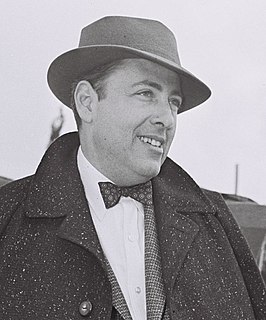A Quote by James Monroe
If we look to the history of other nations, ancient or modern, we find no example of a growth so rapid, so gigantic, of a people so prosperous and happy.
Related Quotes
Iran is an ancient land, home to a proud culture with a rich heritage of learning and progress. The future of Iran will be decided by the people of Iran. Right now, the Iranian people are struggling with difficult questions about how to build a modern 21st century society that is at once Muslim, prosperous, and free. There is a long history of friendship between the American people and the people of Iran. As Iran's people move towards a future defined by greater freedom, greater tolerance, they will have no better friend than the United States of America.
One aspect of modern life which has gone far to stifle men is the rapid growth of tremendous corporations. Enormous spiritual sacrifices are made in the transformation of shopkeepers into employees... The disappearance of free enterprise has led to a submergence of the individual in the impersonal corporation in much the same manner as he has been submerged in the state in other lands.
I think certain periods of history don't get dealt with because I think historians, and it's their job, but they look back and look for patterns. They look for sequences and they look for reasons, and certain periods of history don't fit with the general pattern of 1500 to the 20th century, during which there's the creation of the United States. At this time of 1814, two nations who would eventually become close allies were at war with each other, so it doesn't quite fit.
I don't believe in religion. I believe the example of Christ. I believe in the example of a perfect human being that if you can live for other people away from yourself you will be happy. If you live for yourself you will be unhappy and then you will not be able to sleep or do anything else... finally. I think insofar, and I really believe this, insofar as people do live with the other fellow [God] in mind, they have to be happy you know? Because it raises you up.
. . . the example given by the Nazi regime as to the ability of a modern state to destroy human lives with the same techniques used by modern industry, employing the bureaucratic apparatus readily available to any modern state, is one that can hardly be ignored. Because although history may not repeat itself, it is rare that anything introduced to human history is not used again. Whether the Holocaust was unique or not in terms of its precedents is one question; whether it will remain so is quite another.

































